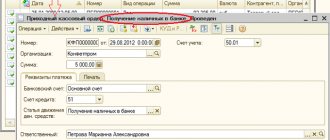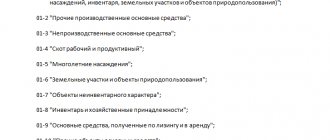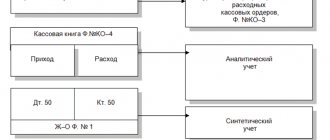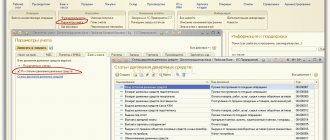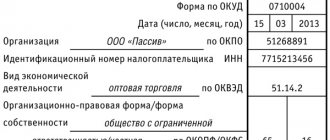Article 31 of the Federal Law of December 23, 2003 N 186-FZ “On the Federal Budget for 2004” establishes that if there are insufficient funds in the taxpayer’s account to satisfy all the requirements presented to him, the funds are written off according to settlement documents providing for payments to budgets of all levels budget system of the Russian Federation and the budgets of state extra-budgetary funds, as well as the transfer or issuance of funds for settlements of wages with persons working under an employment contract, are carried out in the calendar order of receipt of the specified documents after the transfer of payments made in accordance with this article in the first and secondly.- Note from the database manufacturer.__________________________________________________________________________ 1. If there are funds on the account, the amount of which is sufficient to satisfy all the requirements for the account, these funds are written off from the account in the order in which the client’s orders and other documents for write-off are received ( calendar sequence), unless otherwise provided by law.
2. If there are insufficient funds in the account to satisfy all the requirements presented to it, funds are written off in the following order: first of all, according to executive documents providing for the transfer or issuance of funds from the account to satisfy claims for compensation for harm caused to life and health, as well as claims for the collection of alimony; secondly, according to executive documents providing for the transfer or issuance of funds for settlements for the payment of severance pay and wages with persons working or who worked under an employment agreement (contract), for the payment of remuneration to the authors of the results of intellectual activity; thirdly, according to payment documents providing for the transfer or issuance of funds for settlements of wages with persons working under an employment agreement (contract), instructions from tax authorities to write off and transfer debts for the payment of taxes and fees to the budgets of the budget system of the Russian Federation, and also on instructions from the bodies monitoring the payment of insurance premiums to write off and transfer the amounts of insurance contributions to the budgets of state extra-budgetary funds; fourthly, according to executive documents providing for the satisfaction of other monetary claims; fifthly, according to other payment documents in calendar order. Write-off of funds from the account for requirements relating to one queue, it is carried out in the calendar order of receipt of documents. (Clause as amended, entered into force on December 14, 2013 by Federal Law of December 2, 2013 N 345-FZ.
Complete blocking of an account is not an absolute ban on access to money
If trouble does happen and the tax authorities have blocked your account, there is no need to panic. The law allows you to continue spending money from a blocked account, taking into account the order of payments established in the Civil Code of the Russian Federation - all payments that are in this queue before tax payments are not blocked (paragraph 2, clause 1, article 76 of the Tax Code of the Russian Federation).
The order of priority of payments according to the Civil Code of the Russian Federation:
It turns out that from a blocked account it is possible to transfer at least wages and taxes - of course, provided that the bank does not have writs of execution and there are enough funds.
Other transfers (to suppliers, customers, etc.) related to queues 4 and 5 are impossible until the tax authorities unblock the account.
Bailiffs seized the account - what to do? how to unfreeze an account
How do bailiffs seize funds? In accordance with Article 81 of Federal Law No. 229 “On Enforcement Proceedings,” seizure of an account is carried out as follows:
- The decision on collection falls into the hands of the bailiff.
- He, in turn, draws up a resolution to seize the citizen’s funds placed in accounts and sends this document to the relevant banks.
- If the account details are unknown, then the bailiff sends a resolution to search for them to the financial organization.
- The bank employee immediately seizes the funds in the amount of the existing debt. In addition, he informs the bailiff about taking appropriate measures.
- If there is enough money, it is written off and the account is blocked.
Partial account blocking
If the account is partially blocked (due to failure to comply with the tax payment requirement), you can manage the funds on it in the following order:
| There is more money in the account than the blocked amount | There is less money in the account than the blocked amount |
| You have the right to dispose at your own discretion of money exceeding the blocked amount - you can make any payments, including settlements with counterparties | The order of payments is used - first the bank will make payments according to executive documents of the 1st and 2nd stages (if any), then salary payments (if they arrived before tax collection orders). After this, tax and other payments are possible |
Unjustified write-off
Quite often, disputes arise related to the fact that the bank wrote off money completely unreasonably. As a rule, here we are talking about third parties who unauthorizedly used an electronic signature in order to steal money from the client’s account. However, in most cases the court upholds the bank's correctness.
The position of the court in such cases is understandable, since there are no obvious signs of incorrectness of the electronic signature. Such a payment document has all the signs of authenticity:
- the correct account is used;
- a valid certificate is presented;
- An electronic signature is affixed when using the appropriate key.
After checking all the data, it is established that the payment order is genuine and funds are debited from it.
If the client finds himself in such a situation, then his main task is to prove that the payment order was sent by an unauthorized person; accordingly, the bank did not check this data and, as a result, did not fulfill its obligations. The following facts can be used as a defense:
- prove the authenticity of the electronic signature and indicate that there is no client order;
- It is the bank's responsibility to compare the IP address;
- the bank’s responsibility is to draw attention to the fact that the payment order is not properly executed;
- The bank has not checked this document for compliance with anti-money laundering legislation.
From this we can conclude: the right to manage the account should be granted to a very limited and verified circle of people. Then you will be calm about the safety of funds in your current account.
Unusual payment from a blocked account
In the context of blocking money in accounts, businessmen are looking for unusual ways to “pull out” and use frozen funds. One of these ways is to pay the counterparty’s taxes from your blocked account.
Formally, the bank must make such a payment, and the Federal Tax Service cannot prevent the transfer of taxes to the budget (Letter of the Federal Tax Service dated January 25, 2018 No. ZN-3-22/478).
In practice, the reaction of bankers to such a payment may be different:
- They will refuse payment, citing Letter of the Ministry of Finance dated April 16, 2018 No. 03-02-08/26061.
- They will process the payment without any questions asked.
- The payment will be classified as suspicious transactions.
If the bank does not refuse to make the payment if there are sufficient funds in the account and there are no other monetary obligations, the money towards the counterparty’s taxes will be transferred within 24 hours (clause 2 of Article 60 of the Tax Code of the Russian Federation).
Direct write-off
In Russian legislation, there is no precise definition of such a concept as direct write-off. But there is a more general one - debiting funds without the order of the account owner.
As a general rule, money can be written off only after the client’s order. However, in practice there are cases when the opposite situation is possible. For example:
- By the tribunal's decision;
- in certain cases provided for by Russian legislation;
- according to an agreement concluded between the account holder and the bank, which stipulates such cases.
Direct write-off must be exceptional. And if such a clause is specified in the agreement (contract) with the bank, then it must contain clear language and specific cases in which direct debiting of funds is possible. Otherwise, all other methods of writing off funds directly from current accounts are illegal.
Let's sum it up
- The tax office has the right to block a current account for the reasons specified in Art. 76 of the Tax Code of the Russian Federation (for failure to submit a tax return, non-payment of taxes, fees, insurance premiums, etc.). At the same time, only payments for queues 4 and 5 are frozen according to the list of clause 2 of Art. 855 of the Civil Code of the Russian Federation.
- Payments under executive documents, as well as wages and taxes (payments of the 1st, 2nd and 3rd stages), the bank is obliged to execute if there is a sufficient balance in the account.
If you find an error, please select a piece of text and press Ctrl+Enter.
Commentary on Article 855 of the Civil Code of the Russian Federation
1. Sequence of payments - the sequence defined by law for debiting funds from bank accounts according to several payment documents, the payment period of which has already arrived. Article 855 of the Civil Code establishes two rules for determining the priority of payments from accounts belonging to both clients and credit institutions.
The first refers to those cases when the account balance allows you to fully settle all claims made against the account. In this situation, the payment documents presented to the account must be paid in the order of the calendar order of payments, i.e. in the order in which they are received by the payer’s bank (payment is due). Exceptions to this rule may be provided by law, which does not yet exist.
2. The second rule will change if there are insufficient funds in the payer’s account to satisfy all the requirements presented to him. For this case, the article establishes six payment priority groups. The first, second and fifth stages include certain requirements, the validity of which is confirmed by the relevant executive document (Article 339 of the Civil Code). Similar claims that are not based on a writ of execution are subject to payment in sixth place.
3. Documents not paid on time due to lack of funds in the account are placed by the bank in a file cabinet in off-balance sheet account No. 9929 “Settlement documents not paid on time” (card file No. 2). In the event of a change in the legislation on the priority of payments, documents located in card file No. 2 and not paid on the date of entry into force of the relevant law must in the future be paid only taking into account the new priority of payments, and card file No. 2 must be properly revised.
4. Payments assigned to a specific group must be made after full repayment of all previous groups. In accordance with the letter of the Central Bank of the Russian Federation dated 01.03.96 N 245, debiting funds from the account for claims relating to one queue is carried out in the calendar order of receipt of documents or the occurrence of payment deadlines. This regulatory act does not determine the sequence in which payment documents assigned to one queue must be paid if, by law, they must be submitted to the bank at the same time (wages, payments to the Pension Fund of the Russian Federation, income tax, payments to the Federal Social Insurance Fund of the Russian Federation and the State Employment Fund of the Russian Federation) . This problem has been partially solved by clause 31 of the State Tax Service Instruction dated June 29, 1995 No. 35 “On the application of the Law of the Russian Federation “On Personal Income Tax” and clause 50 of the State Bank of the USSR Instruction dated November 26, 1984 No. 27 “On the cash execution of the state budget of the USSR.” These regulations establish the following. If the employers' account does not have enough funds necessary to pay wages in full and transfer the withheld income tax to the budget, then the tax is transferred to the budget in an amount proportional to the amount of funds paid to individuals for wages. At the same time, in payment orders for the transfer of withheld income tax, in the “Purpose of payment” column, it is indicated that taxes are transferred in amounts proportional to the balance of funds in the account. Payment orders for the transfer of social insurance contributions are issued by payer organizations in full. These orders are executed by banks after full satisfaction of wage requirements and transfer of taxes withheld from wages.
5. In the second and third place, payment documents on the issuance or transfer of funds for wages are subject to payment. The list of payments included in the concept of “wages” should be determined on the basis of Instruction of the State Statistics Committee of the Russian Federation dated July 10, 1995 N 89 “On the composition of the wage fund and social payments.”
6. In practice, the question often arises of which document should be placed in file cabinet No. 2 if the client’s account does not have the funds necessary to issue funds for wages. In a letter dated November 19, 1996 No. 17-2-11/978, the Department of Methodology and Organization of Settlements of the Central Bank of the Russian Federation explained that in this case, a client’s application for the issuance of funds indicating the terms for which wages are paid can be placed in file cabinet No. 2.
7. Rule paragraph 2 of Art. 855 of the Civil Code is used to determine the priority of payments for the debts of the account owner. Therefore, it should not be used in cases where the employer’s account is used to pay the debts of its employee. The transfer of these payments can be entrusted to the organization by legislation (alimony under writs of execution, income tax, payments to the Pension Fund) or by order of the employee (voluntary alimony, payments for goods purchased on credit, etc.). The question arises in what order the corresponding settlement documents should be paid. If these deductions from the employee’s salary had not been made, he would have received the amounts due to him in the third place and would have had the opportunity to pay his debts on his own. Therefore, it would be illogical to make such payments in the sixth place. Consequently, the amounts of deductions made by the employer from the employee’s salary must be transferred to the same queue as funds for wages, i.e. to the third. The only exceptions are operations for transferring alimony amounts on the basis of writs of execution - the first stage.
8. In practice, there are many cases when tax inspectorates make demands on taxpayers and their banks to transfer taxes not in the fourth place, but in the first place. They base their claims on the norm of the joint letter of the Ministry of Finance of the Russian Federation (N 76), the State Tax Service of the Russian Federation (N VG-6-09/597) and the Central Bank of the Russian Federation (N 318) dated 08.22.96. Meanwhile, this letter contradicts paragraph 2 of Art. 855 of the Civil Code and therefore is not subject to application (see Resolutions of the State Duma of October 11, 1996 N 682-II GD and N 683-II GD // RG. 10.22.96).
9. Practitioners often experience quite serious difficulties when determining the order of debiting from the account the amounts of penalties to be paid into the budget and extra-budgetary funds. These sanctions can be considered as a “payment” or “deduction” to the budget or to the corresponding extra-budgetary fund, which is discussed in paragraph. third and fourth paragraph 2 of Art. 855 GK. Therefore, these amounts must be transferred to the same queue to which the urgent payment or arrears are to be transferred (i.e., respectively, to the third or fourth, and not to the sixth priority).
10. The order of payments established by Art. 855 of the Civil Code, applies only to non-cash payments, incl. when foreclosure is applied to the debtor's non-cash funds. When foreclosure is applied to other property of the debtor, the order established by Art. Art. 420 - 423 Civil Procedure Code. If a legal entity is declared bankrupt, payments from its account are made in the order provided for in Art. 64 Civil Code.
11. If the payer has several accounts in the same bank, the order of payments established by Art. 855 of the Civil Code, applied to each account separately.
Sequence of payments in bankruptcy
If the paying company is at the stage of bankruptcy, then additional requirements are imposed on orders for the transfer of current payments. They are contained in paragraph 2 of Article 134 of the Federal Law of October 26, 2002 No. 127-FZ “On Insolvency (Bankruptcy)”.
Thus, first of all, requirements for current payments related to legal costs in a bankruptcy case are satisfied; payment of remuneration to the arbitration manager; collection of arrears in payment of remuneration to persons who performed the duties of an arbitration manager in a bankruptcy case.
The first priority also includes payment in favor of persons whom the arbitration manager is obliged to involve in the bankruptcy case on the basis of the law (for example, payment for the services of a servicing bank). At the same time, payment for the activities of other specialists attracted by the manager at his own discretion is included in the third priority.
Secondly, the requirements for payment of wages of persons working or who worked (after the date of acceptance of the application for declaring the debtor bankrupt) under an employment contract, and the requirements for payment of severance pay are satisfied. This same line includes the transfer to the budget of personal income tax withheld from current wages (clause 41.1 of the resolution of the Plenum of the Supreme Arbitration Court of the Russian Federation dated July 23, 2009 No. 60).
In fourth place, utility bills, fees under energy supply contracts and other operating expenses are transferred. Finally, the fifth priority includes claims for all other current payments.
ATTENTION. In field 21 of the payment order, the “bankruptcy” order is not reflected. Control over its compliance is carried out by the credit institution directly when spending funds from the bankrupt’s account. It conducts a check on formal grounds, determining the order of payment based on the information contained in the order or documents attached to it (resolution of the Arbitration Court of the Volga District dated October 8, 2018 No. F06-37700/2018).
What is the order of priority when making a decision from the bailiffs in favor of the tax office?
The debtor's property shall be seized no later than one month from the date of delivery to the debtor of the decision to initiate enforcement proceedings, and, in necessary cases, simultaneously with its delivery. When making a decision to seize the debtor’s property, the bailiff, no later than three days before the date of seizure, notifies the tax authority that sent the resolution to collect the tax (fee), as well as penalties, from the property of the taxpayer-organization (tax agent-organization), about the upcoming seizure of the debtor's property (Appendix No. 5). The bailiff may reflect in the notice the mandatory (taking into account the territoriality of the execution of enforcement actions) presence of a representative of the relevant tax authority when carrying out enforcement actions to seize the following wording: “I ask you to ensure the presence of the representative.”
What to do when accounts are seized by bailiffs. procedure for lifting arrest
Law No. 229-FZ provides for other grounds for ending enforcement proceedings. In particular: – return by the bailiff of the order to collect debt at the expense of the taxpayer’s property, for example, in connection with its withdrawal by the tax authority when granting a deferment or installment plan to the taxpayer (clause 3.17 of the Methodological Recommendations); – declaring the taxpayer bankrupt; – liquidation of the taxpayer. The end of enforcement proceedings is formalized by a resolution of the bailiff (Part.
3 tbsp. 47 Law No. 229-FZ). The bailiff sends a copy of the resolution no later than the next working day to the tax authority and the taxpayer (Part 2 of Article 15, Part 6 of Article 47 of Law No. 229-FZ). No votes yet. Please wait…

